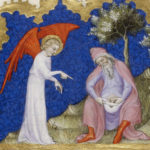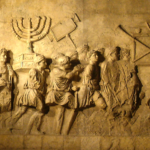There has been much debate over what is Judaism’s most central and important Mitzvah (Commandment). There are some very good arguments for any of a dozen different Mitzvoth.
The following are some examples, as all of them are important.
“The Golden Rule”
There is a story about Hillel and Shamai, two of our greatest scholars who lived at the same time, and fairly rarely agreed on very much. A man visited Shamai and demanded to be taught all of Torah while standing on one foot (this is something of expression to mean ‘very very quickly’). Shamai, according to the story, chased the man away, whacking him with a large stick.
When this man visited Hillel with the same demand, Hillel acted very differently. He said to him, “Do unto your neighbor, as you would have him do unto you.” He then charged the man to go spend all his remaining time in study, as the important parts are in the details.
“Pru or Vu”
Literally, “Be fruitful and multiply.” Judaism does not exist in an individual. Judaism demands a community. We cannot be a light unto the nations as individuals, but only as a community. Communities begin with families, and families build and grow and interconnect and spread. If we make large, strong, healthy communities, we can continue to be a light unto others, and make the world better.
“To Study Torah”
Being an expert on Torah, and Mishnah and all of our great learning are not absolutely necessary to living a proper life, but they do help. The Torah teaches us what the best way to live is, and how it is our actions that are important in life. Torah is what binds us as a people, and it is our mobile homeland when we are living in Galut (exile from the promised land). It is also our source for all Mitzvoth.
 Page after page of short descriptions could be written about absolutely vital Mitzvoth. The point, however, is that none of these has been given the level of importance that The Kodesh Baruch Hu (The Holy One, Blessed is He) gave to one individual mitzvah.
Page after page of short descriptions could be written about absolutely vital Mitzvoth. The point, however, is that none of these has been given the level of importance that The Kodesh Baruch Hu (The Holy One, Blessed is He) gave to one individual mitzvah.
The best leaders and teachers tell us things, and sometimes we listen, learn or obey, and other times we fail. When the best leaders and teachers do things, we want to emulate them, as that is the best way of teaching. Teaching by example is what Judaism was charged with doing, on a global scale. There is one Mitzvah we are given – and ONLY one – by The Kodesh Baruch Hu, by example.
The Kodesh Baruch Hu makes his presence known to Abraham, while Abraham lies sick. Abraham is blessed with the company of Ha’Shem (lit: “The Name”) the whole time he is ill. Ha’Shem does not study Torah, or Safeguard the Sabbath, or bind himself (himself is a convention of language, not meant to imply gender) to any Mitzvah. Except for this one:
The Kodesh Baruch Hu visits the sick.
As must we. If a loved one is ill, you must sit with them. If acquaintances are sick, you must sit with them, and even strangers rate our time. One cannot simply devote one’s life to visiting hospitals, Judaism, Torah, and The Kadosh Baruch Hu demand that at least some of our time be spent bringing company and companionship to those who are ill.






